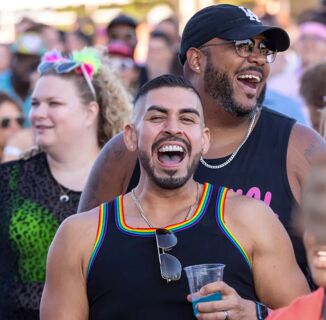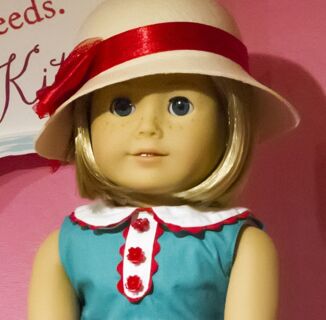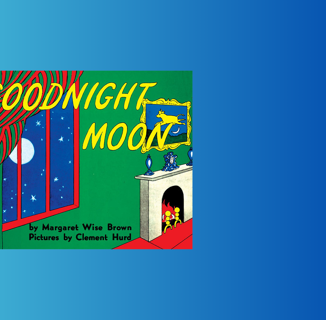Queer as Folk premiered almost two decades ago on Showtime. Its depiction of gay life among a group of Pittsburgh friends is intriguing, problematic, heartwarming, cringe-inducing and often corny. But the stories it wants to tell often have a lot to say about gay life in 2018. So INTO is embarking on a rewatch of the entire series, all five seasons and 83 episodes. In this week’s “Rewatch,” staff writer Mathew Rodriguez revisits episodes seven through nine of Season One. You are invited to follow along on Netflix, where all five seasons are currently streaming.
If you’re asking whether I’m about to spend a whole essay talking about nipple rings, the answer is yes. Because they really are more meaningful than you believe.
This week’s batch of episodes begins in a piercing shop, where Folk’s ur-twink Justin wants to get his nipple pierced not, he lies, to impress budding beau and bedpost notch collector Brian Kinney, but for his own personal aesthetics. Bull.
As I’ve said in earlier recaps, Queer as Folk really wants its viewer to invest themselves in Justin’s journey into queerness. When I first watched the show, I was younger than Justin, and in my Netflix rewatches, I’ve been older. And each time, Justin’s journey means something a little different. When I was younger, his journey was aspirational. At 17, Justin worked up the gall to enter queer spaces, go home with someone, come out to his friends and family and, in the course of just a few episodes, leave home and build a polyamorous commune with his now live-in boyfriend. Talk about action is character.
I’m not at the stage where I’d call Justin cautionary — the show takes care to paint him as naive, but not stupid. He’s also earnest and noble to boot. A total bottom Gryffindor. But his nipple piercing really got me thinking about a conversation I had with a queer friend the other day about how so many queer people go through a histrionic phase at some time in their lives. (In terms of my thot ass, I’ve never exited it.)
For queer people, histrionics is not only about melodrama and theatrics, but also a performative kind of sexuality meant to signify themselves as sexual to those around them. When you’re trying to negotiate your sexual identity, an easy way to do it is to perform your sexuality for others publicly. When you’re young, that often means coming across as sexually experienced and less innocent. You just have to negotiate whether you wanna come off as “Oops!…I Did It Again” non-innocent or “Dirrty” non-innocent.
I modified my body for the first time at 18 years old. I got an Aries tattoo, in rainbow, on my right calf. Though our bodies are very different, I see both my tattoo and Justin’s piercing as ways we wanted our maturing bodies to seem more adult. Justin’s piercing was, of course, sexual in a way my tattoo really wasn’t. But both were meant to queer our bodies — Justin’s by calling attention to his sexuality while my own was meant to announce my proud queer status.
I eventually got my nipples pierced, just like Justin, but at 23 years old, in an East Village tattoo shop. I recognize Justin’s own desire to pierce his nipples in the desire to change my own body. For me, my nipples were a pleasure center and I wanted my piercings to highlight them on my body. But on top of that, I felt like my piercings announced me as sexual to my peers. I was tired of sexual agency being denied me because of my fat body, and sexualizing my nipples was a way for me to wrest the narrative of people of size as unsexy away from others.
Throughout the episode, several people comment on Justin’s new stainless steel accoutrement. His father feels that his ring is him “flaunting” his sexuality (it is!) but in a negative way. He doesn’t want to think of his son as sexual in a queer/feminine way, of course — because he’s a bigot! But Justin really did get the ring to entice Brian and Brian himself seems disinterested in his discussion. Brian, it seems, has a “bumper sticker on a Bentley” approach to bodily adornments.
Often, Brian and Justin’s relationship reminds me of Call Me By Your Name, not because the two actually graph onto each other super well in any way but because, as I’ve said previously, they concern the ultimate queer male mythology — learning about our queerness from a slightly-older-but-not-too-old Adonis who helps us cross the river from queer youth to person who has had queer sex and is therefore totally an adult, right?
That the show chooses to paint Brian as uninterested is a great character choice. Watching Justin as a young person, I saw someone who was making active choices to become the queer person he wanted to be. Watching as an adult, I see him making a series of choices to be the queer person he thinks Brian wants.
In becoming Mathew Rodriguez, I first became an array of versions of myself that I thought older men might want. When people dated me, they were really encountering a vague outline, ready to be sketched in with whatever you wanted. I was a Barbie waiting for her owner to play dress up. I’m not suggesting that’s a universal queer experience, but young queer people often feel as if they are not queer enough and the vision of queerness they hold is capitalistic. They can acquire more queerness from older people who have more queer experiences.
In a way, I’m also angry at these episodes for what I feel they conveyed to me as a baby gay. That if you want someone hard enough, all you have to do is insist and shower them with affection and you can insert yourself into their life! Justin may be 11 years younger than Brian, but he also doesn’t take no for an answer and believes that just by loving him hard enough, Brian will carve out a space for him in his heart. That’s selling a fantasy and an irresponsible one! I would’ve been a lot better off if I knew that unavailable people are unavailable and that we can’t just love someone hard enough to make them change their minds.
Here are a few more stray thoughts from this week’s episodes.
- When Justin’s dad says that Justin got into a fight because he was “flaunting” his body, he reinforced how queer people are always blamed when their queerness is detectable, rather than addressing how straight people react to queerness.
- Michael is dating a chiropractor, David, and the two have sex in his childhood twin bed while his mother is downstairs. It’s a no from me.
- Emmett’s plotline throughout these episodes is that he has cybersex under an alias where he plays a dom top even though he’s a fem bottom. When he shows up at his suitor’s house, he’s able to roleplay and adopt the persona he crafted online. Really, this plot is worth its own essay, but how could I resist nipple rings!?
Help make sure LGBTQ+ stories are being told...
We can't rely on mainstream media to tell our stories. That's why we don't lock our articles behind a paywall. Will you support our mission with a contribution today?
Cancel anytime · Proudly LGBTQ+ owned and operated
Read More in Culture
The Latest on INTO
Subscribe to get a twice-weekly dose of queer news, updates, and insights from the INTO team.
in Your Inbox













